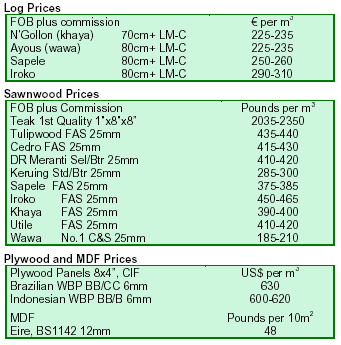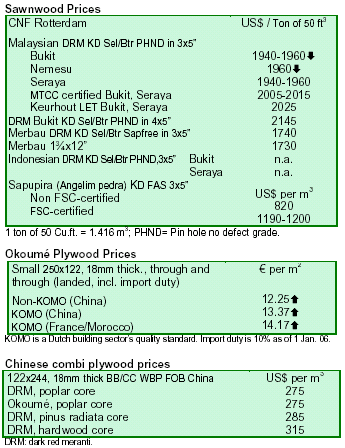|
Report
from the UK
Strong pound hold prices unchanged
With the UK currency at its strongest level against the dollar for over two years and also firm in relation to the
euro, timber product prices remained constant in pounds in late November. However, traders complained that margins
were being further squeezed as costs continued to rise rapidly.
A positive year for the UK furniture industry
The year 2006 has been a good year for the furniture industry according to some analysts, with home sales and
overseas orders improving and an optimistic forecast for the next three years. Furniture retailer ScS Upholstery
reported that annual profits so far in 2006 were the same as last year. Meanwhile, UKí»s factory orders rebounded in
November and export demand rose to its highest level in
11 years, a sign manufacturing in Europeí»s second largest economy may expand for a fourth quarter.
Economists were increasingly worried about the state of the housing market. David Miles, chief UK economist at
Morgan Stanley argued that the market might fall within the next three years, once house price rises came down
below expectations. In the meantime, the Nationwide house price index to be released this week is expected to
show that property inflation remains relatively stable. House builder Bovis said sales activity remained steady
since its interim results in September.
The Confederation of British Industry issued a statement criticizing the governmentí»s tax regime as í░expensive and
complexí▒. It also warned that employers are less optimistic about their prospects than six months ago, as
rising staff and energy costs significantly squeeze profit margins. The Builders Merchants Federation, in turn,
reported a rise in sales in the third quarter of the year, but felt it was too early to say if the improvements were
temporary.

Report
from Netherlands
Political developments decide future of Dutch economy
The Netherlands was in political crossroads after the earlier general elections which took place on 22
November. The Christian Democrats (CDA) won the elections but VVD (liberals), the current coalition partner,
lost seats, which meant that a new coalition with other parties, particularly the Socialist Party, would be needed.
The coming weeks are therefore crucial for the country and the economy, and will test the willingness of parties to
agree a coalition. According to some analysts, some parties could be more pragmatic and in favour of
stimulating certain sectors like the building sector, while others could be more inclined towards social and
conservation issues. The economy is nevertheless performing well and many hope for the continuation of the
current policy for the benefit of the economy.
Timber market remains sluggish ahead of Christmas
The building sector continued to perform well but the demand for tropical timber was still sluggish ahead of the
Christmas holidays. Analysts see it highly unlikely any change for the better before early
January. With meagre domestic demand for meranti and other popular tropical
species, importers were refraining from buying in Malaysia or elsewhere. However, sales prices were holding reasonably well despite some price reductions by
some Dutch retailers to generate business and improve cash flow. Meanwhile, FOB mill prices remained basically
firm as offers were limited. Exporters in Peninsular
Malaysia continued to face even more restricted raw material supply due to the rainy season and probably
prefer to hold back material rather than to spoil the market with low prices and suffer losses.
VROM establishes Equivalence and Comparability body
The Dutch Ministry of Housing, Spatial Planning and Environment (VROM) has recently established the
College for Equivalence and Comparability (CvG), reported Houtwereld. CvG will compare various countrynorms
and standards with the Dutch internal-directives (BRL). The review would include PEFC Finland, PEFC
Germany, FSC Sweden, FSC Brazil, CSA Canada and MTCC Malaysia. According to some analysts, the move
together with the fact that the Dutch Association of Timber Entrepreneurs (VVNH) will stop funding the
Keurhout certification system in 2007 could eventually lead to the elimination of Keurhout. According to the
analysts, there is an increasing interest to support other
certification schemes, in addition to FSC, that also deserve credit.
Okoume plywood prices rise as expected
Demand for plywood continued to be below that of earlier expectations, in parallel to the dull demand for tropical
sawnwood. However, an expected increase in okoume plywood prices finally materialized, with prices surging
from 4.6% to 11.3%. Stocks of okoume veneer and peeling logs in France remained low (equivalent to 5
working weeks) while factories reported committed plywood production till mid-January 2007.

|